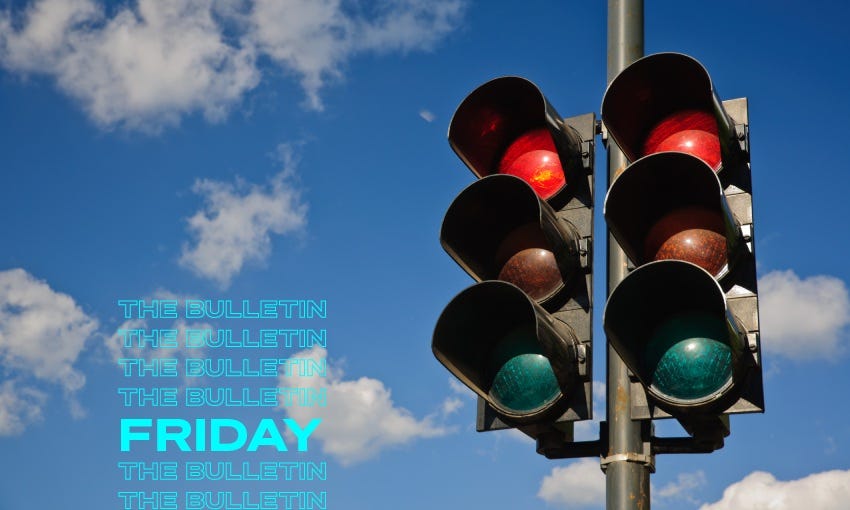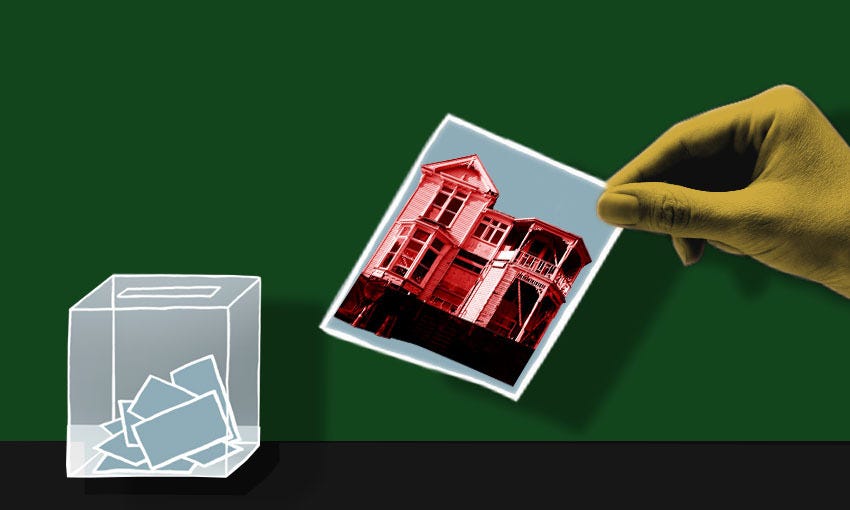The future of Covid-19 restrictions
The prime minister will unveil a replacement for the alert level system today, but it likely won’t be implemented until vaccination levels rise significantly
Mōrena and welcome to The Bulletin for Friday, October 22, by Justin Giovannetti. Presented in partnership with Z Energy.
In today’s edition: A free trade deal with the UK; Wellington council votes to keep the airport; a new governor-general; but first, what follows the elimination strategy.
It might be out with the alert levels and in with the traffic lights. (Horia Varlan/Flickr)
A shift in how we deal with Covid. New Zealand’s four-tier alert level system has been a constant in the country’s response to Covid-19 since it was introduced last March. While it’s been tweaked over the past 20 months, the system has been easy to understand and flexible as the pandemic has shifted. All New Zealanders understand what level four means and yearn for level one.
As the delta outbreak has become permanent and vaccination levels have risen across the country, the alert system is entering its twilight. It was never meant to be permanent. Later this morning, the prime minister will unveil its eventual replacement, expected to be a “traffic light” system based on managing a virus that will remain with us for years to come.
Moving towards green, orange and red (or something else). Dubbed the “Covid-19 protection framework” by Jacinda Ardern earlier this week, the new system will be a significant milestone for the country’s pandemic future. Stuff revealed some of the broad details earlier this month, although some of the specifics may have changed since. Stuff reported that it could have a “green light” with few restrictions for the fully vaccinated; an “orange light” in areas where the virus is spreading and some precautions are needed; and a “red light” that puts limits on gatherings and travel. Note that all of this may have changed in recent days.
The scope of the plan may be significant. Not only will it need to deal with the future of lockdowns, but also where to use vaccine passports and the role of managed-isolation once the population is largely inoculated. The new system won’t be coming immediately, only after a “very high” vaccine threshold is reached, Ardern said on Monday.
12 big questions. For this edition of The Bulletin, here are a number of questions that will need to be answered today or in the near future about the new system. Consider it a checklist and keep it with you if you’re watching today’s announcement.
When will it kick in and will that be triggered by a vaccination target?
Will there be two vaccination targets: One for Māori and another for all New Zealanders?
Is there a plan B, in case we can’t reach those targets?
Does this mean the end of Covid lockdowns going forward?
Does it depend on a vaccine passport system being up and running?
Will this new system determine when schools open and if they close again?
If restrictions are set by region, how local will those regions be?
Can the system be introduced in Auckland while the rest of the country remains in elimination?
Will it also signal a significant change to border settings and MIQ this year?
Will it include rapid antigen testing requirements?
What does this mean for travelling between regions when restrictions change?
Will workplaces remain open even under the highest level setting?
Will the traffic light system provide detailed rules on using other people’s toilets?
The announcement of the new system is expected just after 10am.
A message from The Spinoff publisher Duncan Greive
We’re rapidly approaching 10 weeks in lockdown here in Tāmaki Makaurau, and still unsure when a more recognisable form of living will resume. Which means that for the foreseeable future our staff will be working to bring you the latest from the delta outbreak—and to distract you from it—in a situation with a considerably reduced commercial foundation. This makes us more reliant on our Members than ever. To those who have contributed, a huge thank you from all of us. To readers who enjoy our work and have yet to join The Spinoff Members, please consider doing so today if your circumstances allow it. Head here to donate, or to find out more.
A record day in New Zealand’s pandemic. The number of new daily cases crossed into the triple digits for the first time yesterday with 102 infections detected. With case numbers now expected to double about every 12 days, the daily update is causing “a bit of an emotional rollercoaster” according to the deputy prime minister. During the 1pm standup, it became clear that this is a different outbreak than it was a few weeks ago. On questions from contact tracing to isolating positive cases, director general of health Ashley Bloomfield said there were too many cases for long-used methods to cope. With cases in hospital starting to tick up, RNZ reports that nurses are warning a tsunami is coming.
The Covid numbers: There are 46 cases in hospital and 7 in ICU/HDU. There are now 870 active cases in New Zealand. 94 new community cases were reported in Auckland yesterday and 8 in Waikato. 43,087 people were vaccinated on Wednesday.
The Spinoff’s Covid data tracker has the latest figures.
New Zealand and the UK ink a trade deal. Yesterday’s edition of this newsletter came to you significantly earlier than usual because I had to get to Parliament to read the details of a free trade deal with Britain. In The Spinoff, I report that Jacinda Ardern called it a “historic and substantial” agreement that should mean cheaper British gin here and more bottles of NZ sauvignon blanc in London. For all the soaring rhetoric in the Beehive, the BBC was much less upbeat. It reported that the deal isn’t expected to boost the British economy at all, while UK Labour and farmers say it will lower food standards in Great Britain.
Wellington council votes to keep ownership of the city’s airport. The vote was supposed to be held in secret and residents of the capital hadn’t been consulted on a possible sale, but the Dominion Post reports that council decided at the last minute to open the meeting up. While the vote failed in the end, some councillors wanted to sell the airport to diversify the city’s investment portfolio, saying it’s too exposed if the capital was hit by a natural disaster or climate change. While two-thirds of the airport has already been sold off, it seems an odd choice to sell off municipal assets because of fear they might be wrecked in a future cataclysm.
The Spinoff needs your vote! Show some love by voting for your favourite podcast in the Listener’s Choice category at the New Zealand Podcast Awards.
Click here to vote for Gone by Lunchtime, The Real Pod, When the Facts Change or any of your other favourite podcasts from The Spinoff Podcast Network.
New governor-general Dame Cindy Kiro sworn in. Rukuwai Tipene-Allen has written about Dame Cindy, the daughter of the north and the Queen’s first female Māori representative, for Te Ao Māori News. With an extensive background in academia and as the Children’s Commissioner, Dame Cindy said she would focus on marginalised communities, the environment and children as governor-general.
New Zealand has taken a very odd approach to the climate conference. In a column for the Sydney Morning Herald, Henry Cooke noted that the climate summit problem has been backwards in New Zealand. While leaders around the world have been pressured to go, including by the Queen, and Australia’s prime minister has made travel plans for Scotland after some reluctance, Jacinda Ardern faces zero domestic pressure to travel. Instead, climate change minister James Shaw has faced repeated questions all week about his need to attend at all. Speaking on the Country (paywalled) he got a grumpy about the constant suggestion that he’s being over-indulgent and wasting spaces in managed-isolation by travelling—he’s pointed out that Fiji’s negotiating team will be more than three times as large because of a need to keep New Zealand’s numbers down. The Guardian has reported of fears the summit will now lack ambition because a third of Pacific island leaders can’t attend.
Can’t they use Zoom? Nahh. The summit is massive. Thirty meetings running simultaneously, with participants from nearly 200 countries in each, for 16 hours a day, over two weeks. Zoom isn’t up to that. There’s also all the diplomacy on the side.
Got some feedback about The Bulletin, or anything in the news?
Get in touch with me at thebulletin@thespinoff.co.nz
Right now on The Spinoff: Bernard Hickey predicts the big Labour-National housing deal struck this week will create blowback for the latter. Mirjam Guesgen reports on microplastics floating in the air, influencing our climate and doing us no good. Sam Brooks strolls back to the 80s for the glamour and shoulder-pads of Gloss. Matthew J Saville explains how he got screen icon Charlotte Rampling to star in his new movie. Josie Adams writes, presumably on her smashed phone, about why she'll never get it fixed.
For a happy listen today, what happens when a four-year-old calls 111? There’s just something magical about this boy calling up the cops to talk about his toys. He just wants to share. Stuff has the story and the recording, which is worth a listen.
Black Sticks captain Stacey Michelsen is stepping down. After 12 years and a record 296 caps for a female player, as well as three Olympic games, Michelsen is ending her international career as a legend, the NZ Herald reports. She’s been an ambassador on-and-off the water turf, or any field where she’s got a stick, and the (field) hockey player is now watching the tributes pour in.
That's it for The Bulletin. If you want to support the work we do at The Spinoff, please check out our membership programme.








We are so weird about the climate change summit! Sharon Murdochs cartoons from today and Oct 10th are so true https://i.stuff.co.nz/opinion/94869389/sharon-murdoch-cartoons